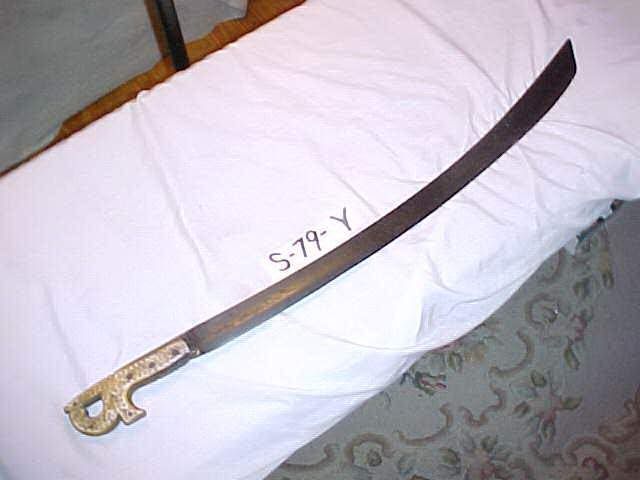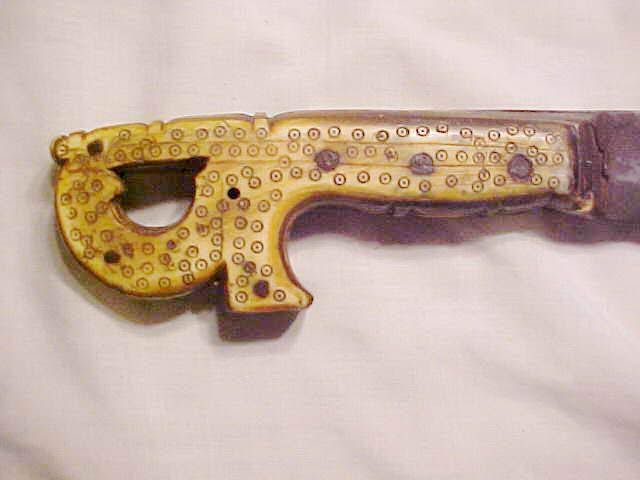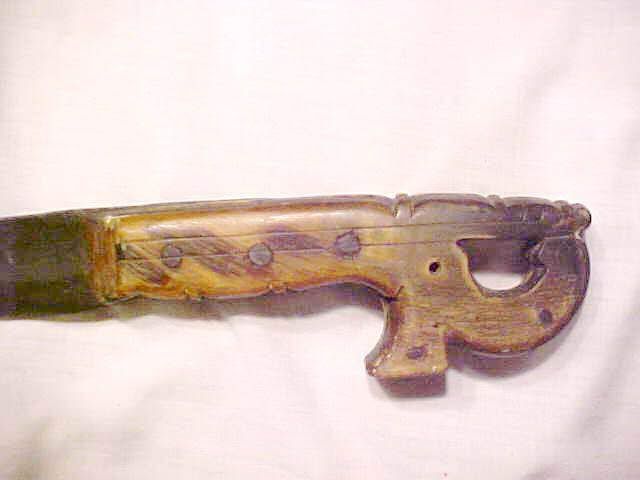
 |
|
|
#1 |
|
Member
Join Date: Jun 2008
Posts: 119
|
mooroccan berber sword?
i had seen this weapon for sale a few months ago labeled as a "corsican cavalry saber" but looking through tirri's book (which i just got today, thanks much rand!  ) i see an almost exactly identical sword labeled as a berber sword from southwest moorocco (spanish sahara) ) i see an almost exactly identical sword labeled as a berber sword from southwest moorocco (spanish sahara)pics:   
|
|
|

|
|
|
#2 |
|
Member
Join Date: Feb 2006
Posts: 637
|
cuban south american . Take Tirri's book for the most part with a grain of salt
|
|
|

|
|
|
#3 | |
|
Member
Join Date: Dec 2004
Location: Bay Area
Posts: 1,621
|
Quote:
|
|
|
|

|
|
|
#4 |
|
Arms Historian
Join Date: Dec 2004
Location: Route 66
Posts: 9,945
|
Good grief! .....Corsican?!! heres a new one!!
Just for kicks, check out the search feature here (its on the top header line, click on it and fill in the line with 'Berber sabre'). These are a 19th century phenomenon......and as we have discussed many times here over the past decade, these seem to have appeared as an anomaly about 15 or so years ago and represented as Berber sabres from the Rif in Morocco. This was the information Tirri was following as he wrote his book ,which is actually a beautifully published book for what it is..a collectors guide. Most of the information is pretty reliable though, and was based on the information on hand at the time it was published. I got one of these about then, and after looking closely at the blade, realized it was a heavily profiled tip on a British M1796 light cavalry sabre. The scabbard had a curious vertical protrusion similar to many Ethiopian scabbard forms for the gurade (in "African Weapons" by Spring). What was most curious, as I have mentioned on many threads, is that these distinctly recognizable sabres do not appear in any of the standard references dealing with Moroccan weapons. It would seem that Buttin would have had one of these in his huge collection as he lived in Morocco for many years, and had every weapon form known there in the 19th c and earlier. I have seen these turn up in Mexican weapons groupings, the Cuban suggestion stands as plausible, and there have even been suggestions for the far reach of the Spanish trade empire, the Philippines or even Indonesia. We have finally established one of these mystery weapons as Cuban (Spanish American machete thread), but the jury is still out on this one.....the Corsican wild card is a good one though!! 
|
|
|

|
|
|
#5 |
|
Member
Join Date: Dec 2004
Location: Bay Area
Posts: 1,621
|
I am leaning towards the Carribean as I have one with the following inscription on the blade "PARA LOS VALIENTES DOMINICANOS". I would be happy to see the mystery solved, whatever the origin of these swords turns out to be.
|
|
|

|
|
|
#6 |
|
Arms Historian
Join Date: Dec 2004
Location: Route 66
Posts: 9,945
|
Thats great Teodor, I'm pretty much with you that these seem more Caribbean and in the Spanish colonies also. It would seem to me that they might well have reached the Spanish Sahara in a small number, but certainly not enough to represent an established weapon form there.
What is most curious to me is the deliberate profiling of the blade tip, with a certain similarity to the type of profiling seen on the tip of many kampilan blades, not necessarily suggesting a connection, just noting it. On the example I had there was what remained of a stamped name ..MANU.e? suggesting of course Manuel, cold stamped near the forte on the M1796 blade. These swords seem more machete than anything else, and as more of a utility item than weapon, it seems to explain more these may have evaded individuals cataloguing the weapons of regions such as Morocco as noted. All best regards, Jim |
|
|

|
|
|
#7 |
|
Member
Join Date: Dec 2004
Location: Ann Arbor, MI
Posts: 5,503
|
Couple of years ago I was at a meeing in Versailles ( France, of course:-)...)
There was a big oil painting in the Palace , dating from the 18th century(?) and depicting some episode in North African warfare.At the right lower corner, there was a fierce Arab holding exactly this kind of sword. I did not have a camera ( and photography was officially banned). perhaps, one of our French friends can find the picture and provide an account. |
|
|

|
|
|
#8 |
|
Member
Join Date: Feb 2006
Posts: 637
|
I have never seen anything similar in museums or in the souqs in North Africa. It is always possible that it is but the only reference I have seen saying that is Tirri.
|
|
|

|
|
|
#9 |
|
Member
Join Date: Dec 2004
Location: Inland Empire, Southern California USA
Posts: 160
|
I see Artzi has a couple colonial spanish swords similar to the sword in this thread, with profiled tip and all. I didn't link to Oriental Arms web site without permission. Maybe Artzi will chime in here. I have one of these swords too and always thought them to be berber, but quickly changing my mind. Probably found their way to spanish morroco, cuba or where ever Spanish troops were sent.
 
|
|
|

|
|
|
#10 |
|
Member
Join Date: Dec 2004
Location: NC, U.S.A.
Posts: 2,097
|
Very interesting development on these. Just read this thread and had assumed that these were absolutely of Moroccan origin. Interestingly enough, over a decade ago I had one of these. When I bought it, they told me it was a "Cuban sword from the Span-Amer War". Now this early guess might be proved out. I can see the cross-over from Spanish Morocco to a Caribbean area. One only has to remember the pirate routes from the Corsairs territory across the ocean to the West Indies. I'm reminded of a sword reportedly carried by one of Captain Morgan's European crewmen that was a Chinese ken sword. Interesting...
The thing is, when you look at the first example on this thread, you see a cut-down Euro sword with a fairly common pattern seen in Mexico and S America today (19th century machetes, the Brazilian espada discussed, etc.). BUT I have seen some that are not cut-down Brit pieces, but ones with flared points on them (Artzi has had several examples). My point is, if you're ever seen the wide variety of reused/recycled blades reworked into machetes, it would be easy to write these off as only from the Cuban region). Other examples, with their decoration, hilt elements and blade design, make it seem entirely possible that these came from Morocco. In which case, they made the jump from the Rif Valley to Havanna nicely! |
|
|

|
|
|
#11 |
|
Arms Historian
Join Date: Dec 2004
Location: Route 66
Posts: 9,945
|
[QUOTE=chevalier]mooroccan berber sword?
i had seen this weapon for sale a few months ago labeled as a "corsican cavalry saber" but looking through tirri's book (which i just got today, thanks much rand!  ) i see an almost exactly identical sword labeled as a berber sword from southwest moorocco (spanish sahara) ) i see an almost exactly identical sword labeled as a berber sword from southwest moorocco (spanish sahara)I think we misunderstood Chevalier, were we supposed to respond? It seemed like this was a question. |
|
|

|
|
|
#12 |
|
Member
Join Date: Jun 2008
Posts: 119
|
more of conversation starter.
|
|
|

|
|
|
#13 | |
|
Arms Historian
Join Date: Dec 2004
Location: Route 66
Posts: 9,945
|
Quote:
You indeed are a conversation starter!  and you have presented quite a few great topics! and you have presented quite a few great topics! I am under the impression that you are a beginning collector and want to learn more on the weapons and subjects you are asking about. The best way to learn is of course, to ask a question, then to read what others contribute. Having done that, use what you understand from the material to ask other questions on that particular topic concerning the material, this becoming a discussion. I know that many of us spend time researching material in order to answer questions, and if you are satisfied with the responses you receive, acknowledging or expressing appreciation is a nice gesture. Best regards, Jim |
|
|
|

|
 |
|
|